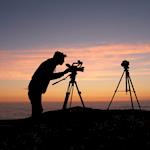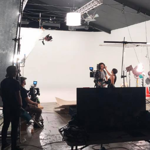Filmmaking has frequently been at the forefront of technological advances. Indeed, professionals in the field have frequently utilized their creativity and technical knowledge to cultivate innovations. Over the history of cinema, the emergence of the Steadicam, motion tracking, and green screen have all come from filmmakers utilizing tech skills for problem-solving.
It’s also important to note that we live in a technological age. Sure, advanced digital tools in themselves don’t make a movie great. But they can be instrumental in empowering you to push your creativity a little further. As these tools become more accessible and affordable to independent filmmakers, there is enormous potential for creativity. Nevertheless, you still need to nurture a range of relevant abilities to make the most of them.
So, let’s take a look at a handful of tech skills that can improve your filmmaking.
Coding
Coding is considered one of the most important skills to learn in almost any field. From a technical standpoint, coding is about utilizing languages that give systems instructions on how to function. But it is also a discipline in which you’ll develop problem-solving and creative skill sets. Importantly, it is the most meaningful way to interact with and utilize the tools of our digital age.
But how does this help to improve your filmmaking? Well, it comes down to offering you an additional level of control over the creative technology you can use. If you want to create a rudimentary motion control rig to capture beautiful time lapse shots, coding gives you the skills to program camera movements. If you’re utilizing open-source software for editing or visual effects (VFX), coding can help you tailor presets to your needs.
If you’re completely unfamiliar with coding it can be wise to utilize resources aimed at teaching programming to teens and kids. This is because such tools are geared toward practical introductions in common languages like Python and Java. Programming logic projects help illustrate how syntax directly impacts actions. Coding games can also be effective in empowering you to learn the basics faster.
Animation
In many ways, animation was the earliest form of filmmaking. Stop motion techniques giving the illusion of movement are the key principles upon which all film photography is based. But technology has progressed significantly since the early years of cinema. 2D and 3D animation software packages are more accessible and user-friendly than at any other point in history. In many cases, all you need is a relatively basic computer and some time to learn the techniques.
Even if you don’t specialize in animated films, learning to use animation software can be beneficial to you. It can help you to create more interesting title sequences for your live-action projects. You can also integrate animated characters with live-action sequences. However, animation skills in themselves are currently in-demand. Indeed, animation was one of the few film sectors that didn’t suffer so much during the pandemic, as animators can work from home.
There are certainly formal courses and qualifications you can pursue to gain skills here. Though it’s certainly not necessary to head to CalArts or seek a Disney internship. Many filmmakers learn to use the technology through self-driven education. An increasing number of studios recognize the value of animators’ personal project portfolios. There are also various tutorials on YouTube that can take you through industry standard software like Toon Boom Harmony.
Web Design
Web design is among the key tools of our digital landscape. This isn’t just about creating visually captivating websites people enjoy visiting. As the internet is a primary form of communication today, one of the core responsibilities of web designers is making sites accessible to everyone. This includes the need for user-friendly navigation and making inclusive color and contrast decisions. Skilled web designers create positive experiences for all demographics.
From a filmmaking perspective, these web design skills help you to connect with audiences. Websites and online content materials are among the most important marketing forms at your disposal. When you gain expertise here, you have the power to create online marketing campaigns to effectively match the vision of your projects. Not to mention that learning to do this yourself can be kinder to your independent film budget.
Learning the fundamentals of web design — particularly the tools of accessibility — can benefit from a structured course. You don’t need to go to school to do this, as there are plenty of e-learning programs available. Nevertheless, experience comes from trial and error. Start building your own websites using content management systems (CMS) like WordPress or Squarespace. These are relatively user-friendly platforms and the more you experiment, the more sophisticated design choices you can discover.
Editing
Editing is both a technical discipline and an art form. It’s more than simply cutting together shots to produce a film. The technology and techniques you utilize during the editing process fundamentally shape the look and feel of the project. Your ability to communicate the story that you’ve been chasing since pre-production depends upon the quality of your editing. A film may have nothing but incredible creative dialogue with exquisite cinematography, but bad editing can make these confusing.
In recent years, editing software has become both more accessible and capable of greater flexibility. Suites you can utilize with the average laptop give you access to color grading, chroma key techniques, and creative transitions. By learning how to use this technology yourself, you gain more control over the final product as a filmmaker. You’re not having to communicate your needs and ideas to an external professional. Alternatively, if you want to collaborate with an editor, your knowledge here can help you express your ideas more effectively.
You don’t necessarily have to attend film school to become a skilled editor for your own projects. Many of the popular software platforms are user-friendly enough for you to engage with guidance from online tutorials. Indeed, there is an increasing number of e-learning courses available if you want something more structured. But as with any creative discipline, you need to put time and energy into experimenting with this craft and its tools.
Conclusion
The film industry is frequently discovering and embracing new forms of technology. These tools in skilled hands can be instrumental in taking a project to the next level of quality and creativity. Even as an independent filmmaker, it is important to upskill your tech abilities in various areas.
Coding can give you greater control over the technology you use. Learning animation gives you additional creative options for your projects. Understanding the fundamentals of web design helps you market your films in engaging and accessible ways. While education in editing software can empower you to communicate your stories effectively. Many of these skills don’t require formal education. But with some commitment and guidance, you can become a technologically and creatively agile filmmaker.












Comments
There are no comments on this blog post.